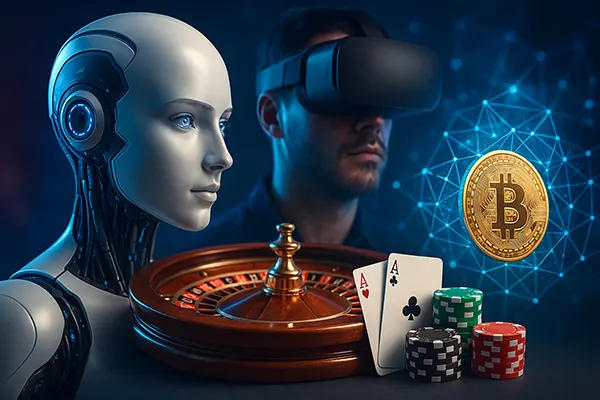
Technologies Transforming the Gambling Industry in 2025: AI, VR/AR, and Blockchain
The gambling industry in 2025 is shaped by technological innovation that changes every aspect of how people play, interact, and trust digital systems. Artificial intelligence, immersive reality, and blockchain are no longer experimental tools but key drivers of transformation, setting new standards for fairness, security, and user engagement.
Artificial Intelligence: Smart Systems for Personalised Gambling
Artificial intelligence (AI) enables digital gambling environments to adapt to each player’s behaviour in real time. It analyses habits, preferences, and spending patterns, allowing operators to personalise experiences and encourage responsible gaming. This not only improves engagement but also helps prevent problem gambling through predictive alerts and tailored recommendations.
AI also powers customer service, automating responses to common queries and optimising technical support. Analytical insights from industry resources, including https://apostarlive.com/en/, illustrate how advanced algorithms enhance transparency and improve the quality of gambling reviews and operational analytics without compromising user trust.
Security systems based on AI now detect fraudulent activity within seconds. Machine learning models monitor transaction patterns, flagging irregular behaviour before losses occur. This intelligent protection has become a standard in 2025, creating a safer and more accountable gambling ecosystem.
Benefits and Limitations of AI Integration
The benefits of AI are evident in its precision and scalability. It automates risk analysis, supports customer loyalty systems, and ensures personalised recommendations. However, full automation poses ethical concerns related to data privacy and algorithmic bias, which operators must address through transparency and strict data governance.
Players, on the other hand, gain better service but should remain aware of how their data is used. Responsible regulation and human oversight are vital to avoid unfair restrictions or unintended discrimination by automated systems.
Balancing AI innovation with accountability defines the industry’s sustainable growth model, proving that technology can improve safety while maintaining human responsibility.
VR/AR and Blockchain: Redefining Experience and Trust
Virtual and augmented reality (VR/AR) transform how players experience gambling. They introduce realistic, interactive settings where users can communicate and play as if in a real venue. By 2025, many casinos experiment with 3D environments that merge entertainment, social interaction, and personalisation.
At the same time, blockchain technology underpins financial transparency. Every transaction and game result is stored in an immutable ledger, giving players verifiable proof of fairness. Cryptocurrency payments, smart contracts, and decentralised verification make operations faster and safer than traditional systems.
Together, these technologies create a new era of digital trust. VR/AR immerse users, while blockchain ensures that behind the visuals lies verified integrity and data security.
Advantages and Future Challenges
The integration of VR/AR and blockchain brings freedom, transparency, and innovation. Players enjoy realism and fairness; operators reduce risks and simplify auditing. Both sides gain confidence in digital systems that no longer rely on intermediaries.
Yet, accessibility remains a challenge. High hardware costs, uneven internet coverage, and complex blockchain interfaces slow adoption in some regions. Developers are actively simplifying these tools for broader use.
As technology matures, the industry is moving toward a unified digital ecosystem where immersion, security, and accountability coexist — forming the foundation of gambling in 2025 and beyond.
